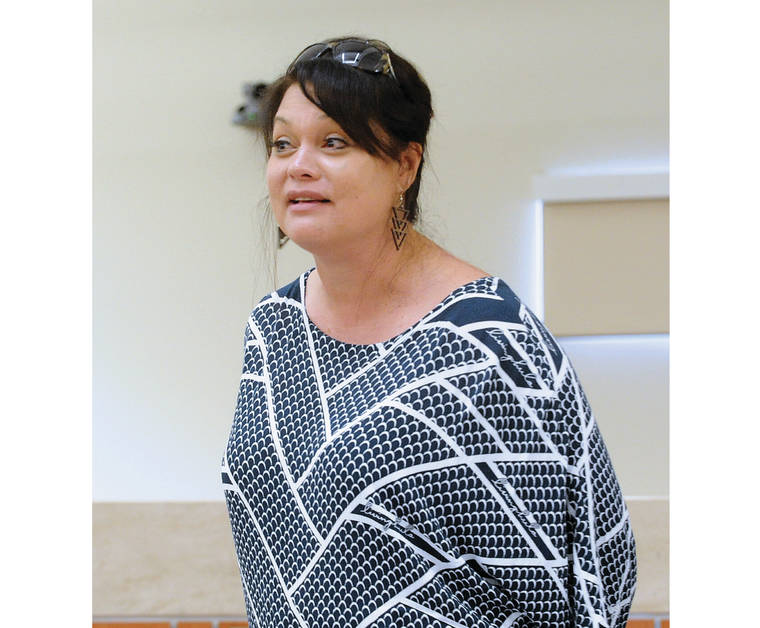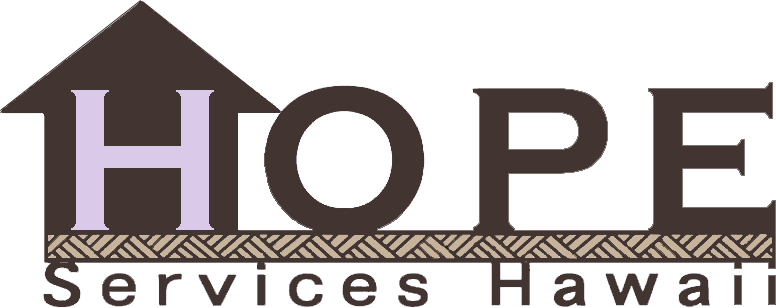 Dr. Hannah Preston-Pita, chief executive officer of BISAC explains the LEAD program Thursday at the West Hawaii Civic Center. (Laura Ruminski/West Hawaii Today)
Dr. Hannah Preston-Pita, chief executive officer of BISAC explains the LEAD program Thursday at the West Hawaii Civic Center. (Laura Ruminski/West Hawaii Today)
KAILUA-KONA — A new program to reduce incarceration and increase mental health and addiction treatment is launching in West Hawaii.
LEAD (Law Enforcement Assisted Diversion) gives police officers the discretion of offering intervention rather than arrest for nonviolent offenders, reducing a continuous cycle through the court system.
The pilot project, which received $650,000 in Ohana Zone funding from the state, launched its marketing campaign Thursday at the West Hawaii Civic Center.
“The program will be for repeat low level drug offenders and other low level offenders as well,” said Dr. Hannah Preston-Pita, CEO of the Big Island Substance Abuse Council.
The BISAC will operate the pilot project along with several key partners, including HOPE Services Hawaii, Going Home Hawaii and Bridge House. The Hawaii County Police Department and Prosecutor’s Office are also on board with the project, which will initially operate only in Kona but may eventually expand across the island.
“It is a harm reduction approach so they can be using substances throughout the program and we’re meeting them at the level they are at and where they’re ready to commit,” Preston-Pita said. “It’s a social service project that is intended to link individuals to services and keep them out of trouble.”
Hawaii County Prosecutor Mitch Roth welcomed the new program, which has experienced early success on Oahu and Maui.
“As you may be aware our local jail is at its maximum capacity,” Roth said. “The LEAD program will be focused on low risk individuals, low need individuals, generally committing lower level crimes. By diverting these people from the criminal justice system we can make the best use of our limited resources.”
Drug court, by comparison, is another program used across the county that aims at higher risk individuals who commit felonies, Roth pointed out.
Hawaii County Public Defender Ann Datta said by diverting the population eligible for LEAD they can benefit from more services instead of sending them to jail where treatment is limited. In addition, the program will reduce the office’s caseload.
Preston-Pita said the program is expected to be operational in about three weeks after working out details with the police and prosecutor’s office.
“We are really excited to begin the LEAD program on Hawaii Island,” said Preston-Pita. “With the lack of resources on our island, this program will definitely make a big impact. Our mayor, prosecuting attorney, chief of police and our local providers – Hope Services, Bridge House and Going Home – have been ready since day one to add this program as a resource.”
“BISAC and ADAD (the Hawaii Department of Health’s Alcohol and Drug Abuse Division) have been planning this program for the last couple of months and now it’s finally here,” she added.
Assistant Police Chief Robert Wagner said as the program is in the beginning stages, “the role of the police is yet to be clearly defined.”
“At times officers use discretion whether to arrest or not, regardless if it is the LEAD program or not,” he said.
Although there will initially be only four beds available at the HOPE Services emergency shelter for the program, once Kukuiola, or Village 9, is open, program participants will be housed there.
Kukuiola is still awaiting the final draft of the environmental assessment and may not open until the third quarter of next year.
“I am excited about the implementation of the LEAD program on Hawaii Island and more specifically in West Hawaii,” said Mayor Harry Kim in a press release. “I am so proud of our police officers and all others involved in this program.”
According to the National LEAD Support Bureau, the program was developed and launched in Seattle in 2011 in an attempt to move away from the War on Drugs paradigm and to reduce gross racial disparities in police enforcement.
LEAD — a new harm-reduction oriented process for responding to low-level offenses such as drug possession, sales, and prostitution was the result of an unprecedented collaboration between police, prosecutors, civil rights advocates, public defenders, political leaders, mental health and drug treatment providers, housing providers and other service agencies, and business and neighborhood leaders working together to find new ways to solve problems for individuals who frequently cycle in and out of the criminal justice system under the familiar approach that relies on arrest, prosecution, and incarceration.
In a LEAD program, police officers exercise discretionary authority at point of contact to divert individuals to a community-based, harm-reduction intervention for law violations driven by unmet behavioral health needs.
In lieu of the normal criminal justice system cycle — booking, detention, prosecution, conviction, incarceration — individuals are instead referred into a trauma-informed intensive case-management program where the individual receives a wide range of support services, often including transitional and permanent housing and/or drug treatment.
Prosecutors and police officers work closely with case managers to ensure that all contacts with LEAD participants going forward, including new criminal prosecutions for other offenses, are coordinated with the service plan for the participant to maximize the opportunity to achieve behavioral change.
There are LEAD projects already operating on Oahu and Maui. Honolulu’s LEAD pilot began in July 2018, and a recent 1-year evaluation found that participants saw a 55 percent reduction in law enforcement citations, an increased feeling of wellness, and a decrease in meth use. Maui’s LEAD program began in May and its participants are already showing positive results. Kauai LEAD just recently launched as well.
“The launch of Kona’s LEAD program represents another step forward in our effort to resolve homelessness,” said Gov. David Ige in a press release. “We are confident that LEAD will make a positive difference and improve the well-being of participants on Hawaii Island, just as it has on Oahu and Maui.”
Read the article direct through West Hawaii Today here.
